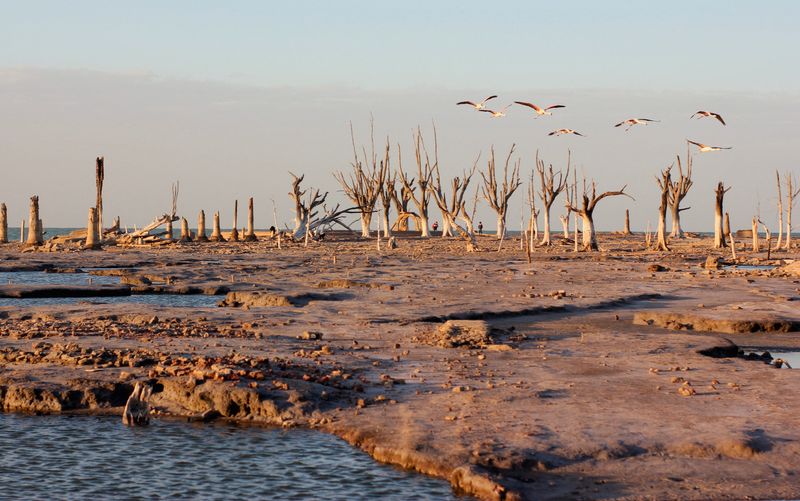[ad_1]

© Reuters. Flamingos fly over the remains of the city of Miramar de Ansenuza, flooded in the 70’s, and now uncovered by a prolongued drought affecting the Mar Chiquita lagoon, in Cordoba, Argentina February 20, 2023. REUTERS/Sebastian Toba
By Jorgelina do Rosario and Jorge Otaola
LONDON/BUENOS AIRES (Reuters) – Argentina’s government is in final talks with International Monetary Fund officials to ease foreign exchange reserves targets for 2023 under the country’s $44 billion program, two sources close to the matter told Reuters.
The move comes as the South American commodities exporter is facing the worst drought in 60 years, which has pummeled soy, corn and wheat crops, compromising already weak foreign exchange reserves.
Discussions include the impact of the drought on 2023 goals for net reserves, said an Argentina economy ministry adviser who asked not to be named because the talks were ongoing.
Talks are now focused on agreeing on exact figures, said one of the sources. An Argentine government source, who asked not to be named because discussions are private, said talks are ongoing but nothing is defined yet.
Officials for the Economy Ministry declined to comment.
A spokesperson for the IMF said that the Fund’s staff and the Argentine authorities are discussing the fourth review of the programme, and it will communicate the outcome of those discussions in due course.
A group of representatives from Argentina’s central bank and Economy Ministry arrived in Washington this week for the fourth review of the extended fund facility program approved in March 2022, after a failed bailout four years earlier.
Meanwhile, Economy Minister Sergio Massa met with IMF Managing Director Kristalina Georgieva on the sidelines of the Group of 20 meetings in Bengaluru, India.
The talks to change the central bank net reserves targets for this year are pre-emptive, as the country did meet its end-December 2022 net reserves targets, another source added.
The world’s top exporter of soy oil and meal is also facing a rise in import costs of energy and fertilizers due to the war in Ukraine, adding pressure to much-needed dollar reserves.
These discussions come shortly after the country decided in January to start a debt buyback of its overseas debt of up to $1 billion. Earlier this month, IMF official Nigel Chalk said that Argentina shouldn’t undermine targets to rebuild its “scarce” foreign currency reserves.
Net reserves today stand at around $4.4 billion, according to calculations from Buenos Aires-based brokerage firm PPI Inversiones.
Under the latest review, Argentina had been set the target of net reserves to increase by $5.5 billion at the end of March and $9.8 billion at the end of the year.
[ad_2]
Source link
(This article is generated through the syndicated feed sources, Financetin doesn’t own any part of this article)
